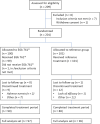Ginkgo biloba extract EGb 761® improves cognition and overall condition after ischemic stroke: Results from a pilot randomized trial
- PMID: 37063270
- PMCID: PMC10090660
- DOI: 10.3389/fphar.2023.1147860
Ginkgo biloba extract EGb 761® improves cognition and overall condition after ischemic stroke: Results from a pilot randomized trial
Abstract
Background: Patients who experienced an ischemic stroke are at risk for cognitive impairment. Quantified Ginkgo biloba extract EGb 761® has been used to treat cognitive dysfunction, functional impairment and neuropsychiatric symptoms in mild cognitive impairment and dementia. Objectives: To assess the cognitive-related effects of EGb 761® treatment in patients after acute ischemic stroke, as well as the feasibility of patient selection and outcome measures. Methods: We conducted a randomized, multicentric, open-label trial at 7 centers in China. Patients scoring 20 or lower on the National Institutes of Health Stroke Scale were enrolled between 7 and 14 days after stroke onset and randomly assigned to receive 240 mg per day of EGb 761® or no additional therapy for 24 weeks in a 1:1 ratio. Both groups received standard treatments for the prevention of recurrent stroke during the trial. General cognitive function and a battery of cognitive tests for sub-domains were evaluated at 24 weeks. All patients were monitored for adverse events. Results: 201 patients ≥50 years old were included, with 100 assigned to the EGb 761® group and 101 to the reference group. The mean change from baseline on the global cognitive function as assessed by the Montreal Cognitive Assessment score was 2.92 in the EGb 761® group and 1.33 in the reference group (between-group difference: 1.59 points; 95% confidence interval [CI], 0.51 to 2.67; p < 0.005). For cognitive domains, EGb 761® showed greater effects on the Hopkins Verbal Learning Test Total Recall (EGb 761® change 1.40 vs. reference -0.49) and Form 1 of the Shape Trail Test (EGb 761® change -38.2 vs. reference -15.6). Potentially EGb 761®-related adverse events occurred in no more than 3% of patients. Conclusion: Over the 24-week period, EGb 761® treatment improved overall cognitive performance among patients with mild to moderate ischemic stroke. Our findings provide valuable recommendations for the design of future trials, including the criteria for patient selection. Clinical Trial Registration: www.isrctn.com, identifier ISRCTN11815543.
Keywords: Ginkgo biloba extract; cognitive function; ischemic stroke; post-stroke recovery; randomized trial.
Copyright © 2023 Cui, You, Zhao, Liu, Guan, Liu, Liu, Wang and Dong.
Conflict of interest statement
The authors declare that the research was conducted in the absence of any commercial or financial relationships that could be construed as a potential conflict of interest.
Figures



Similar articles
-
Efficacy and safety of Ginkgo biloba extract EGb 761 in mild cognitive impairment with neuropsychiatric symptoms: a randomized, placebo-controlled, double-blind, multi-center trial.Int J Geriatr Psychiatry. 2014 Oct;29(10):1087-95. doi: 10.1002/gps.4103. Epub 2014 Mar 16. Int J Geriatr Psychiatry. 2014. PMID: 24633934 Clinical Trial.
-
A randomized, open-label clinical trial in mild cognitive impairment with EGb 761 examining blood markers of inflammation and oxidative stress.Sci Rep. 2023 Apr 3;13(1):5406. doi: 10.1038/s41598-023-32515-6. Sci Rep. 2023. PMID: 37012306 Free PMC article. Clinical Trial.
-
A double-blind, placebo-controlled, randomized trial of Ginkgo biloba extract EGb 761 in a sample of cognitively intact older adults: neuropsychological findings.Hum Psychopharmacol. 2002 Aug;17(6):267-77. doi: 10.1002/hup.412. Hum Psychopharmacol. 2002. PMID: 12404671 Clinical Trial.
-
Ginkgo biloba Extract EGb 761 in the Treatment of Patients with Mild Neurocognitive Impairment: A Systematic Review.Neuropsychiatr Dis Treat. 2023 Mar 23;19:647-660. doi: 10.2147/NDT.S401231. eCollection 2023. Neuropsychiatr Dis Treat. 2023. PMID: 36994422 Free PMC article. Review.
-
Strategies for the use of Ginkgo biloba extract, EGb 761® , in the treatment and management of mild cognitive impairment in Asia: Expert consensus.CNS Neurosci Ther. 2021 Feb;27(2):149-162. doi: 10.1111/cns.13536. Epub 2020 Dec 22. CNS Neurosci Ther. 2021. PMID: 33352000 Free PMC article.
Cited by
-
Efficacy of ginkgo diterpene lactone meglumine on cognitive function in patients with acute ischemic stroke: a predefined exploratory analysis of a multicenter, double-blind, randomized controlled trial.J Neurol. 2024 Jun;271(6):3321-3327. doi: 10.1007/s00415-024-12272-w. Epub 2024 Mar 12. J Neurol. 2024. PMID: 38472398 Clinical Trial.
-
The mechanisms of efficacy and safety of Ginkgo biloba extract in acute ischemic stroke: a real-world study.Thromb J. 2025 Feb 7;23(1):10. doi: 10.1186/s12959-025-00696-x. Thromb J. 2025. PMID: 39920681 Free PMC article.
-
Agarwood leaf ethanol extract provides neuroprotective properties and promotes cholinergic differentiation of HT22 hippocampal neurons.Sci Rep. 2025 Mar 25;15(1):10230. doi: 10.1038/s41598-025-93462-y. Sci Rep. 2025. PMID: 40133398 Free PMC article.
-
Efficacy and Hemorheology of Ginkgo biloba Extract (EGb 761) in the Treatment of Sudden Sensorineural Hearing Loss: A Retrospective Study.Noise Health. 2024 Jul-Sep 01;26(122):383-389. doi: 10.4103/nah.nah_73_24. Epub 2024 Sep 30. Noise Health. 2024. PMID: 39345081 Free PMC article.
-
Sodium Metabisulfite-Induced Hematotoxicity, Oxidative Stress, and Organ Damage Ameliorated by Standardized Ginkgo biloba in Mice.J Toxicol. 2023 Oct 10;2023:7058016. doi: 10.1155/2023/7058016. eCollection 2023. J Toxicol. 2023. PMID: 37854041 Free PMC article.
References
-
- Bent S., Goldberg H., Padula A., Avins A. L. (2005). Spontaneous bleeding associated with ginkgo biloba: A case report and systematic review of the literature: A case report and systematic review of the literature. J. general Intern. Med. 20 (7), 657–661. 10.1111/j.1525-1497.2005.0121.x - DOI - PMC - PubMed
LinkOut - more resources
Full Text Sources

